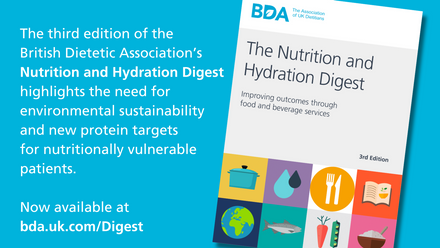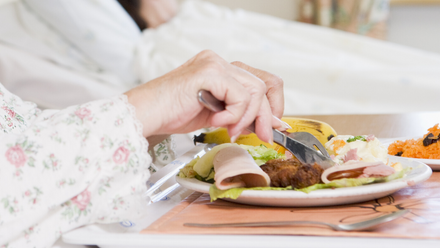The British Dietetic Association (BDA) welcomes the Independent Review of NHS Hospital Food Report, published today, which is comprehensive in its scope and makes a number of bold recommendations for improvement and change.
Andy Burman, BDA CEO, says: “It is now vitally important that ministers move forward with implementing the recommendations. We need investment in services, infrastructure and our hard-working catering workforce.
“Ministers must now work to ensure this does not go the way of previous reviews into hospital food, with good ideas but little follow through.
“It will be absolutely vital to maintain the recommended ongoing expert panel to monitor progress and highlight where further action is needed.”
Invest in hospital food
The specific calls for investment in hospital catering are particularly welcome. It has for too long been a ‘go-to’ department for cuts by hospitals forced to tighten their belts.
Maxine Cartz, Chair of the BDA Food Services Specialist Group, says: “Food is an essential part of treatment for all patients, and must be resourced as such.
“A significant proportion of patients are at risk of malnutrition or nutritionally vulnerable in another way. For all patients, good nutrition supports a healthy immune system and improved wound healing.
“Utopia for me is food being eaten and enjoyed whilst also meeting nutritional needs; this is no different for people in hospital for whom food is an essential part of their care.”
It is also important that Covid-19 is not allowed to be a barrier – good food is still needed by those using our hospitals, and this report gives us a toolkit to deliver on that.
Importance of dietitians in hospital catering
The BDA strongly endorses the call for support to ensure every hospital has funding for a food services dietitian. Dietitians are the food and nutrition experts, and all hospitals should have dedicated access to that expertise.
The input of the BDA and dietitians, both on the panel and in individual contributions throughout, has shown the vital impact dietitians can make on hospital food.
Lauren Bowen, Vice-Chair of the BDA Food Services Specialist Group, says: “Providing the best possible food service for hospital patients is complex. A food service dietitian can act as the main interface between catering and clinical services.
“Dietitians have the skills to be involved in every level of food service we have the unique overview of how the food service will impact on nutritional care.
“Ultimately food service dietitians can promote improvement to food services that are cost-effective, good quality, safe and meet nutritional standards for all patients.”
The BDA says that too often dietitians with full clinical workloads are expected to handle food services as an afterthought. For a relatively small investment, government can improve patient recovery outcomes.
Keeping hospital food safe
The review was undertaken as a result of the food safety issues exposed by the tragic listeria poisonings at a number of hospitals in the North West of England in 2019.
It is clear that we need greater focus on food safety from senior teams, with clearer communications channels and reporting procedures. Equally important is proper inspection and enforcement of standards – what doesn’t get checked won’t get noticed.
We need real leadership now from Ministers and senior teams within NHS trusts to seize this chance to ensure that hospitals are places where food forms a key part of every patient’s treatment and recovery.
Notes to the Editor:
- The British Dietetic Association (BDA), founded in 1936, is the professional association and trade union for dietitians in Great Britain and Northern Ireland. It is the nation’s largest organisation of food and nutrition professionals with over 9,500 members.
- Dietitians are highly qualified health professionals that assess, diagnose and treat diet and nutrition problems at an individual and wider public health level. They are statutorily regulated by the Health and Care Professions Council (HCPC), alongside other Allied Health Professions.
- Dietitians use the most up to date public health and scientific research on food, health and disease, which they translate into practical guidance to enable people to make appropriate lifestyle and food choices. They work in the NHS, private practice, industry, education, research, sport, media and government. Their advice influences food and health policy across the spectrum from government and global industry to local communities and individuals.






